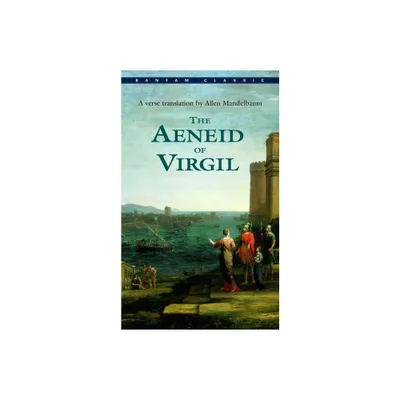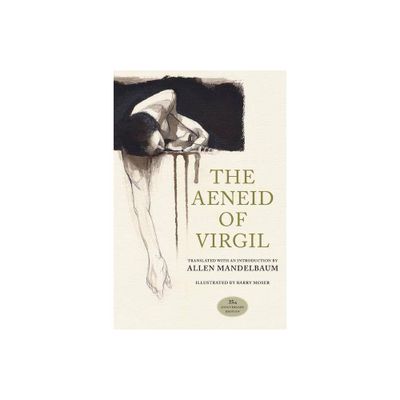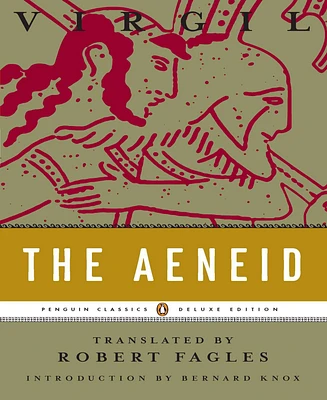Home
The Aeneid by Virgil: Annotated with short biography
Loading Inventory...
Barnes and Noble
The Aeneid by Virgil: Annotated with short biography
Current price: $14.42


Barnes and Noble
The Aeneid by Virgil: Annotated with short biography
Current price: $14.42
Loading Inventory...
Size: OS
*Product Information may vary - to confirm product availability, pricing, and additional information please contact Barnes and Noble
Publius Vergilius Maro (October 15, 70 BC - September 21, 19 BC), usually called Virgil or Vergil in English, was an ancient Roman poet of the Augustan period. He is known for three major works of Latin literature, the Eclogues (or Bucolics), the Georgics, and the epic Aeneid. A number of minor poems, collected in the Appendix Vergiliana, are sometimes attributed to him. Virgil is traditionally ranked as one of Rome's greatest poets. His Aeneid has been considered the national epic of ancient Rome from the time of its composition to the present day. Modeled after Homer's Iliad and Odyssey, the Aeneid follows the Trojan refugee Aeneas as he struggles to fulfill his destiny and arrive on the shores of Italy-in Roman mythology the founding act of Rome. Virgil's work has had wide and deep influence on Western literature, most notably the Divine Comedy of Dante, in which Virgil appears as Dante's guide through hell and purgatory. Virgil's biographical tradition is thought to depend on a lost biography by Varius, Virgil's editor, which was incorporated into the biography by Suetonius and the commentaries of Servius and Donatus, the two great commentators on Virgil's poetry. Although the commentaries no doubt record much factual information about Virgil, some of their evidence can be shown to rely on inferences made from his poetry and allegorizing; thus, Virgil's biographical tradition remains problematic. The tradition holds that Virgil was born in the village of Andes, near Mantua in Cisalpine Gaul. Scholars suggest Etruscan, Umbrian or even Celtic descent by examining the linguistic or ethnic markers of the region. Analysis of his name has led to beliefs that he descended from earlier Roman colonists. Modern speculation ultimately is not supported by narrative evidence either from his own writings or his later biographers. Macrobius says that Virgil's father was of a humble background; however, scholars generally believe that Virgil was from an equestrian landowning family which could afford to give him an education. He attended schools in Cremona, Mediolanum, Rome and Naples. After considering briefly a career in rhetoric and law, the young Virgil turned his talents to poetry. According to the commentators, Virgil received his first education when he was five years old and he later went to Cremona, Milan, and finally Rome to study rhetoric, medicine, and astronomy, which he soon abandoned for philosophy. From Virgil's admiring references to the neoteric writers Pollio and Cinna, it has been inferred that he was, for a time, associated with Catullus' neoteric circle. However schoolmates considered Virgil extremely shy and reserved, according to Servius, and he was nicknamed "Parthenias" or "maiden" because of his social aloofness. Virgil seems to have suffered bad health throughout his life and in some ways lived the life of an invalid. According to the Catalepton, while in the Epicurean school of Siro the Epicurean at Naples, he began to write poetry. A group of small works attributed to the youthful Virgil by the commentators survive collected under the title Appendix Vergiliana, but are largely considered spurious by scholars. One, the Catalepton, consists of fourteen short poems, some of which may be Virgil's, and another, a short narrative poem titled the Culex ("The Gnat"), was attributed to Virgil as early as the 1st century AD. The Aeneid is widely considered Virgil's finest work and one of the most important poems in the history of western literature. Virgil worked on the Aeneid during the last eleven years of his life (29-19 BC), commissioned, according to Propertius, by Augustus. The epic poem consists of 12 books in dactylic hexameter verse which describe the journey of Aeneas, a warrior fleeing the sack of Troy, to Italy, his battle with the Italian prince Turnus, and the foundation of a city from which Rome would emerge. The Aeneid's first six books describe the journey of Aeneas from Troy to Rome


















